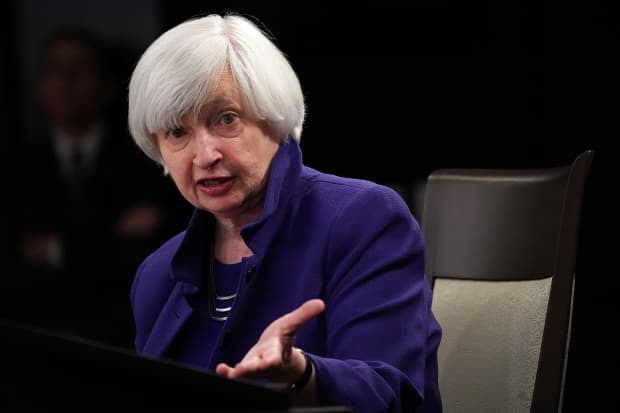This post was originally published on this site

Then-Federal Reserve Chairwoman Janet Yellen speaks during her last news conference in office on Dec. 13, 2017 in Washington.
Getty Images
Janet Yellen will make history if confirmed as the first woman to head the U.S. Treasury. She is also an example for women snubbed by powerful men that they don’t have to give up.
Two years ago, Yellen wanted a second term as Fed chairwoman. She was in the running and was fairly popular on Wall Street, but President Donald Trump decided to give the job to Jerome Powell, then a sitting Fed governor, in part, it has been reported, because Powell looked the part.
After this blow, Yellen did not retreat to her home in California. Instead, she stayed in Washington at the Brookings Institution and was a sought-after speaker and commentator on the economy. Maybe that should have been a sign that she wanted to return to top economic policy circles.
The prestigious Treasury secretary post would be the latest high-powered position for Yellen. President-elect Joe Biden decision’s to nominate her was first reported by the Wall Street Journal on Monday.
“Yellen has decades of proven policy-making and management experience and is well-respected by her international counterparts and can hit the ground running,” said Tim Duy, a Fed watcher and professor at the University of Oregon.
After a career teaching at UC Berkeley, Yellen came to Washington to be a Fed governor in 1994, during Alan Greenspan’s lengthy term as Fed chairman. She left after three years to head the Council of Economic Advisers under President Bill Clinton.
Following this first stint in Washington, Yellen spent six years as the president of the San Francisco Fed district bank starting in 2004. It was there that she witnessed firsthand the rapid rise in home prices that became the housing bubble, which eventually burst in 2008 and sank the economy into the financial crisis.
Yellen returned to Washington to be No. 2 at the Fed under Chairman Ben Bernanke in 2010. She became the first Fed chairwoman in 2014 after months of a bitter contest waged in the press over whether the post should go instead to former Treasury Secretary Larry Summers, a top Obama adviser.
It was Sen. Elizabeth Warren, the Democrat from Massachusetts, and a leading progressive, who helped Yellen get the top Fed job. Warren mustered support of a few allies in the Senate and, with a solid Republican minority also against Summers, told the Obama White House that they didn’t have the votes to get him confirmed.
The 74-year-old Yellen was widely viewed as a dovish chairwoman. She was once criticized by Republicans in Congress when she gave a speech about the problem of rising income inequality. She also highlighted government policies that increase women’s participation in the workforce.
See: The income-inequality story, as told by Yellen’s charts
Inside the Fed, Yellen was viewed as having a remarkable sense of the economic outlook. She was ahead of the curve in seeing the coming housing bubble that led to the financial crisis.
Yellen had a cordial relationship with the Obama-Biden administration and those ties seem to have put her at the top of the list to be Treasury secretary.
Today, the most controversial decision of her four-year term as Fed chair was her push to raise the Fed’s policy interest rate off of zero in December 2016.
Many economists now believe this rate hike was premature because inflation remained below the central bank’s 2% target. Fed officials have pledged in this recession not to hike rates on any forecast and will wait to see actual inflation.
One weak spot is that Yellen, an academic by nature, was not very adept in her relations with Congress.
As a result, some analysts don’t think she will taking on the role of shuttle diplomacy with leadership on Capitol Hill, a role that Treasury Secretary Steven Mnuchin has relished.
“I do not see her filling a role similar to current Secretary Mnuchin’s, as I highly doubt we will see Yellen engaging in difficult one-on-one negotiations with Senator [Mitch] McConnell and others on the Hill,” said Stephen Stanley, the chief economist of Amherst Pierpont Securities, in a note on Monday.
Perhaps Biden, a master of the Senate, will keep that role for himself.

